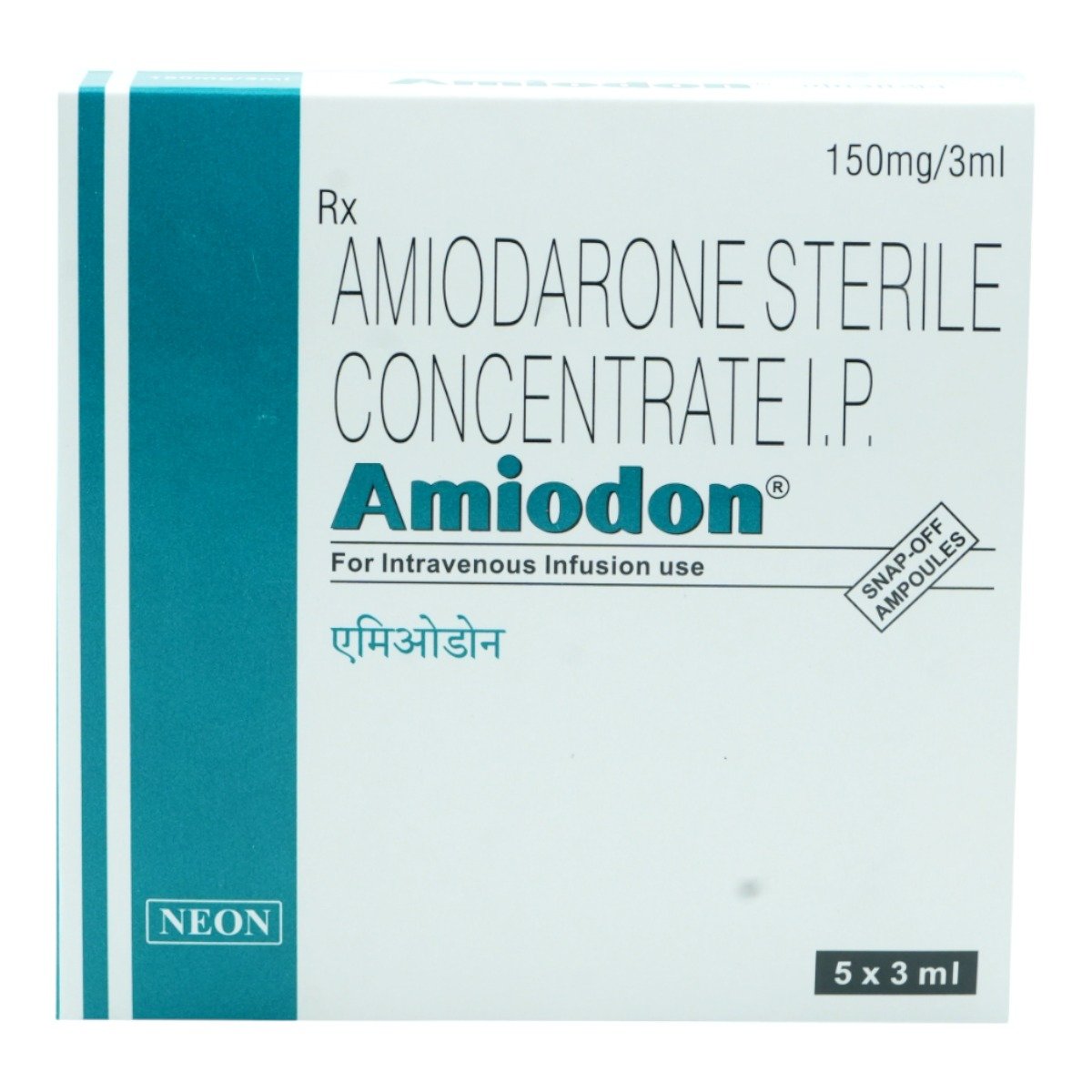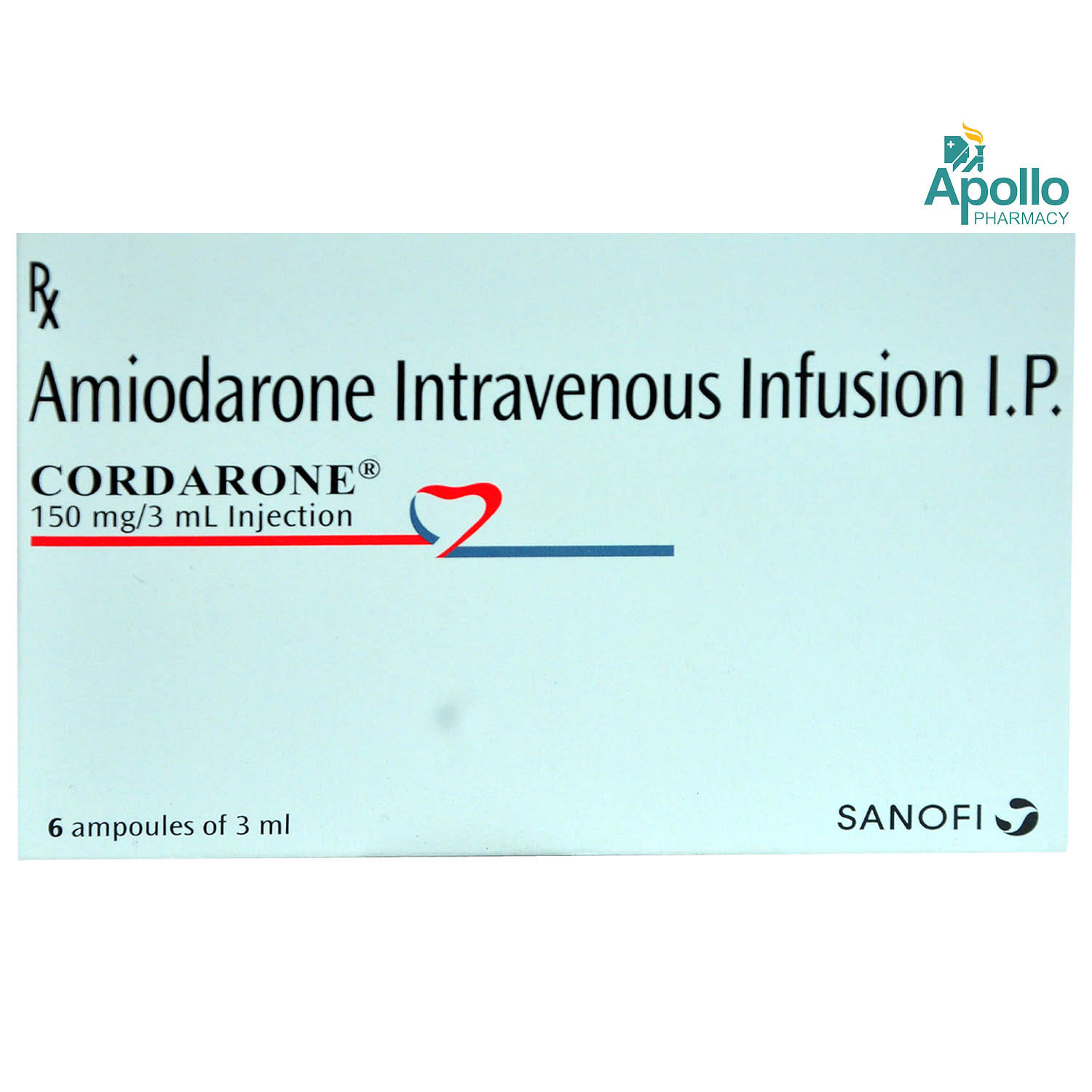Omibeat 150 mg Injection 3 ml
MRP ₹70.99
(Inclusive of all Taxes)
₹10.7 Cashback (15%)
Provide Delivery Location
Online payment accepted
 Prescription drug
Prescription drugWhats That
Composition :
Manufacturer/Marketer :
Consume Type :
Return Policy :
About Omibeat 150 mg Injection 3 ml
Omibeat 150 mg Injection 3 ml belongs to a class of antiarrhythmic medications primarily used to treat arrhythmias (irregular heartbeats). An arrhythmia is a heart rhythm disorder in which the heart may beat too slowly, too fast, or in an uneven pattern.
Omibeat 150 mg Injection 3 ml contains amiodarone, which regulates the heartbeat by altering the electrical impulses passing through the heart. Thereby, Omibeat 150 mg Injection 3 ml helps to restore regular heart rhythm.
Omibeat 150 mg Injection 3 ml will be administered by a healthcare professional; do not self-administer. Omibeat 150 mg Injection 3 ml may cause side effects such as nausea, loss of appetite, dry mouth, blurred vision, and dizziness. Most of these side effects of Omibeat 150 mg Injection 3 ml do not require medical attention and gradually resolve over time. However, if the side effects persist or worsen, reach out to your doctor.
Notify your doctor if you are pregnant or planning for pregnancy so that your doctor will weigh the benefits and any potential risks before prescribing Omibeat 150 mg Injection 3 ml to you. Keep your doctor informed about your health condition and medications to rule out any side effects. Avoid driving or operating any tools or machinery as Omibeat 150 mg Injection 3 ml may cause dizziness and blurred vision.
Uses of Omibeat 150 mg Injection 3 ml
Directions for Use
Key Benefits
Omibeat 150 mg Injection 3 ml belongs to a class of antiarrhythmic medications primarily used to treat arrhythmias (irregular heartbeats). Omibeat 150 mg Injection 3 ml blocks the abnormal electric signals and regulates the heartbeat. Thereby, Omibeat 150 mg Injection 3 ml helps to restore regular heart rhythm.
Storage
Drug Warnings
Do not use Omibeat 150 mg Injection 3 ml if you are allergic to iodine, amiodarone, or any other antiarrhythmic drugs; if you have atrioventricular (AV) or sinoatrial (SA) heart block (disorders in the rhythm of the heart), unless you have a pacemaker or a history of sinus bradycardia (slow heartbeats), or if your heart cannot pump blood properly. Omibeat 150 mg Injection 3 ml may contain iodine and lactose, so inform your doctor if you have lactose intolerance or any thyroid problems. Inform your doctor if you have breathing problems, vision problems, high/low blood pressure, thyroid disorder, electrolyte imbalance, lung, heart, kidney, or liver problems; if you have a pacemaker or defibrillator implantation.
Diet & Lifestyle Advise
- Follow a well-balanced and healthy diet that includes vegetables, fruits, whole grains, legumes, omega-3-rich foods, and lean protein sources.
- Spend time with your loved ones to cope with stress and practice mindfulness techniques.
- Limit or avoid alcohol consumption.
- Quitting smoking is the best strategy to lower the risk of heart diseases.
Side Effects of Omibeat 150 mg Injection 3 ml
- Nausea
- Loss of appetite
- Dry mouth
- Blurred vision
- Dizziness
Habit Forming
Therapeutic Class
All Substitutes & Brand Comparisons
RX
Out of StockScodarone 150mg Injection
₹47
(₹14.1/ 1ml)
40% CHEAPERRX
Out of StockCardasol 150mg Injection
₹59.76
(₹17.93/ 1ml)
24% CHEAPERRX
Duron Injection 3 ml
Samarth Life Sciences Pvt Ltd
₹67.5
(₹19.8/ 1ml)
16% CHEAPER
Author Details
We provide you with authentic, trustworthy and relevant information
FAQs
Drug-Drug Interactions Checker List
- QUINIDINE
- DISOPYRAMIDE
- PROCAINAMIDE
- SOTALOL
- VINCAMINE
- PIMOZIDE
- SULPIRIDE
- THIORIDAZINE
- CISAPRIDE
- MOXIFLOXACIN
- ERYTHROMYCIN
- AMITRIPTYLINE
- CLOMIPRAMINE
- DOXEPIN
- IMIPRAMINE
- NORTRIPTYLINE
- TERFENADINE
- HALOFANTRINE
- SOFOSBUVIR
Special Advise
- If you are due to undergo any surgery or medical tests, inform your doctor that you have taken Omibeat 150 mg Injection 3 ml.
- Regular blood tests, cardiac function monitoring, eye exams, and chest x-ray are recommended.
- Omibeat 150 mg Injection 3 ml may cause light-headedness. Avoid getting up too soon from a sitting or lying position.
Disease/Condition Glossary
Arrhythmia: Arrhythmia is a problem associated with the rate of rhythm at which the heart beats. Generally, in this condition, the heart beats too fast, too slow, or irregularly. It can lead to severe heart damage. A cardiac arrhythmia occurs when there are abnormal electrical signals in the heart. When the heart beats too fast, it is known as tachycardia; if it is too slow, it is called bradycardia. Treatment of arrhythmia includes drugs, medical procedures, implantable devices and sometimes surgery.

Have a query?
Alcohol
Safe if prescribed
Omibeat 150 mg Injection 3 ml may interact with alcohol and worsen liver conditions. So, it is recommended to avoid alcohol intake while on treatment with Omibeat 150 mg Injection 3 ml.
Pregnancy
Consult your doctor
Inform your doctor if you are pregnant or suspect pregnancy. Your doctor will weigh the benefits and potential risks before prescribing Omibeat 150 mg Injection 3 ml.
Breast Feeding
Consult your doctor
Avoid breastfeeding while on treatment with Omibeat 150 mg Injection 3 ml.
Driving
Safe if prescribed
Omibeat 150 mg Injection 3 ml may cause vision problems and dizziness. So, avoid driving or operating heavy machinery after taking Omibeat 150 mg Injection 3 ml.
Liver
Consult your doctor
Omibeat 150 mg Injection 3 ml might affect the liver. So, if you have a history of liver diseases/conditions, inform your doctor; your doctor will assess the benefits and potential hazards.
Kidney
Consult your doctor
Omibeat 150 mg Injection 3 ml should be used with caution in persons with kidney problems. So, if you have a history of kidney disease/conditions, inform your doctor; your doctor will weigh the benefits and risks.
Children
Safe if prescribed
Please consult your doctor if you have any concerns regarding the usage of Omibeat 150 mg Injection 3 ml in children.









_0.jpg?tr=q-85)
